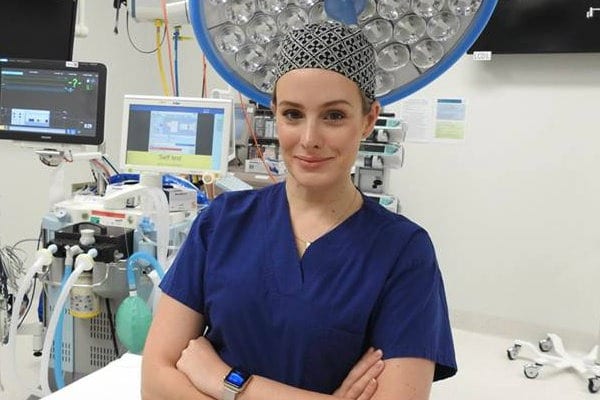Mikhail Varshavski has all the makings of an influencer: a perfectly symmetrical face, 4.1 million Instagram followers and an adorable dog for posing purposes. The difference between him and Cristiano Ronaldo, though, is the prefix in front of his name: Dr.
Welcome to the rise of the doctorfluencer: medical professionals building cult followings and raking in sponsorship deals on social media.
There’s @shesinscrubs, a Florida-based nurse with 79,000 Instagram followers who reps Japanese green tea and protein shakes (while in scrubs), @joycethedentist, an Orange County cosmetic dentist with a megawatt smile and 31,000 followers, and @drjengunter, an OB/GYN and author of The Vagina Bible, who has 68,000 followers and a disclaimer in her bio that reads: “Posts not medical advice.”
*******
Want more women’s health content delivered to your inbox? Subscribe to Women’s Health News for our weekly update.
*******
It’s brand-new territory. Not so long ago, medical professionals shied away from the spotlight – adopting their middle names on Facebook, using sunset pics as their profile photos and setting their accounts to top-secret private. Remember the classic Oral B ads, ‘This man is a dentist, so we can’t show you his face on television’?
“Doctors on social media hasn’t always been something that was deemed okay. In fact, for some, it’s still not seen as okay. There are absolutely real concerns around the way we might use social media with concerns about professionalism and confidentiality the prime worries,” says Dr Nikki Stamp, a heart surgeon and acclaimed author with 40,000 followers on Instagram.
“Some studies from the early 2010’s showed that health care workers (including students) had posted pictures privately or publicly that showed them drinking, perhaps risking confidentiality or being discriminatory.”
There isn’t a Social Media 101 class at medical school, but some argue there should be.
“I actually think that the lack of quality physicians on social media has led to the rise of social influencers pedalling miraculous cures and detox teas,” says our old friend Dr Varshavski, known as @doctor.mike on Instagram.
Dr Stamp agrees: “As social media has become more widespread, doctors online are more normal and have an important role to play. For me, one of the most important reasons for doctors to be taking up space in your feed is that a big part of our role in society should be to commit to public health. And one of the ways we can do this is by sharing information in a way that is easy to understand and helps people take control of their health.”
So, when she’s not performing lifesaving surgery, Dr Stamp is fighting the good fight against misinformation on Instagram, where she regularly answers questions, dispels myths and posts health PSAs, like: “Don’t take health prescriptions from travel bloggers.”
Last month, Dr Stamp shared a photo of herself in scrubs celebrating getting the COVID-19 #vaccine to encourage others to do the same. “I know some people listen to what I have to say, and I want to use that to inspire people’s confidence to get this vaccine,” she wrote.
Clearly there is a place for educated voices on social media, but what happens when said voices start plugging Tide Antibacterial Fabric Spray and Sunbeam FlexTemp™ Hot & Cold Joint Wraps? Where is the line between educating the public and endorsing products for profit?
It’s been argued that the only person who should be influencing someone’s health is their own doctor, and sure, in theory that’s entirely true. But in reality, the Internet exists. We can’t expect people to scroll through Instagram with their hands partially covering their eyes to avoid seeing posts about essential oils, intermittent fasting or the dangers of at-home work outs. It would be like telling victims of trolling to just delete their Twitter account – and what do we say to that? – “That’s victim blaming and it’s gross.”
Anyway, back to the point… Instead of banning medical professionals from having public social media accounts in case someone takes their advice to drink more water too seriously and ends up in hospital with overhydration, maybe we can all use some common sense.
Every social media post should be viewed with an asterisk: Not everything on the Internet is true, don’t believe all the stuff you read on Reddit, this selfie has been FaceTuned within an inch of its life, and consult your own GP before making decisions about your health*
Likewise, we should be able to trust our highly educated medical professionals (who’ve spent years training to work in the most high-pressure of industries) to think before they post – and leave the skinny tea endorsements to the Kardashians.
In Philadelphia, medical centre Jefferson Health has hired a chief medical social media officer, @austinchianmd, who also happens to be incredibly photogenic and good at TikTok dance videos (which were no doubt the top criteria for the job, before his medical degree).
While we wait for other hospitals to follow suit and for medical schools to introduce our aforementioned Social Media 101 class, let’s all take the doctorfluencer movement like a margarita: with a pinch of salt.
As Dr Stamp says, “Our behaviour [as doctors] should be held to a higher standard but let’s not forget the fact that the world desperately needs, now more than ever people to talk accurately and in a relatable way about health and science.”
The other thing the world desperately needs now is more photos of Doctor Mike’s dog. I, for one, welcome our doctorfluener Insta overlords.


